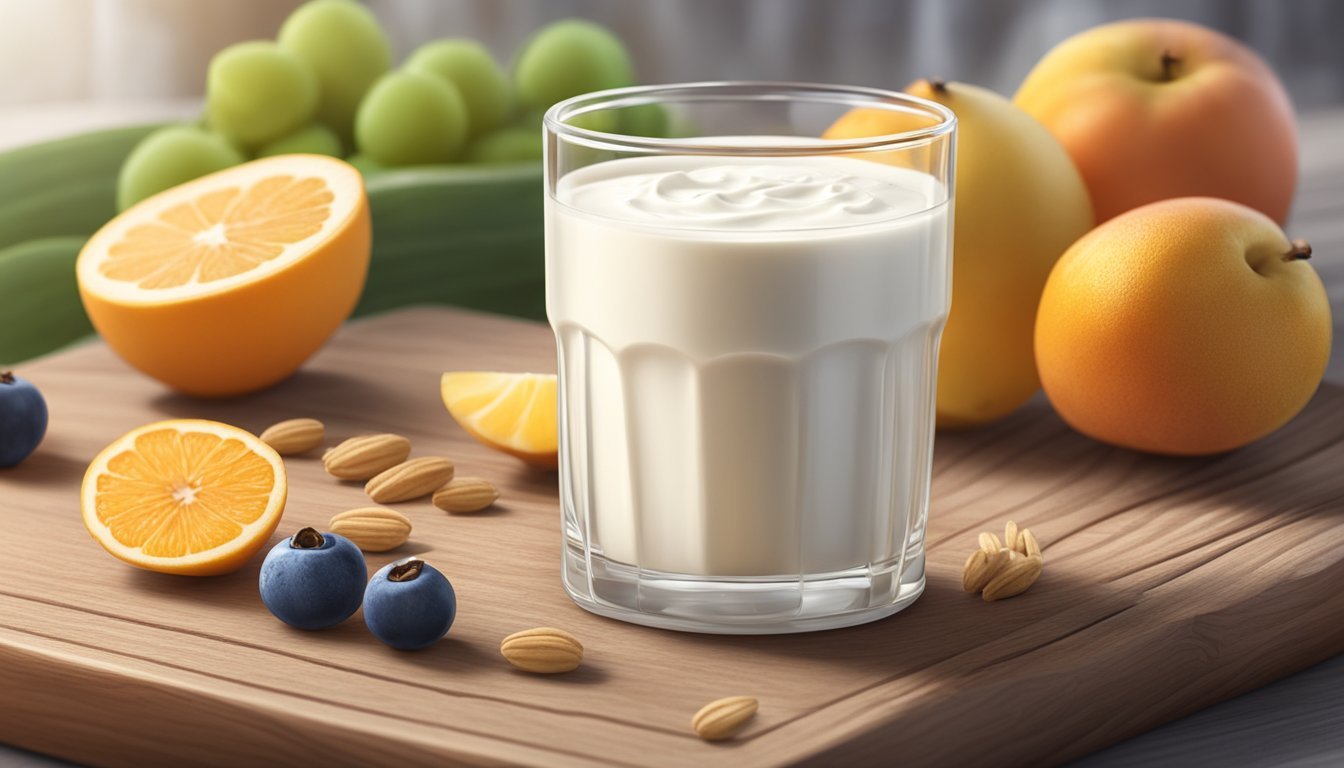Foods Rich in Natural Digestive Enzymes
Key Ingredients for Optimal Digestion
In today's health-conscious world, understanding the role of digestive enzymes is crucial for maintaining a balanced diet and promoting optimal digestion. Digestive enzymes naturally occurring in food help the body break down complex nutrients, ensuring that essential vitamins and minerals are efficiently absorbed.
Incorporating foods high in digestive enzymes into your diet can significantly improve digestive health and overall well-being. Knowing which foods are rich in these enzymes can aid in making informed dietary choices that support digestive function and enhance nutrient uptake.
1) Papaya
Papaya is renowned for its rich content of digestive enzymes, particularly papain. Papain is a proteolytic enzyme, meaning it helps break down proteins into smaller peptides and amino acids.
This enzyme plays a vital role in aiding the digestive process. Consuming papaya can be beneficial for those experiencing digestive discomfort, such as bloating or gas, by improving protein digestion and nutrient absorption.
In addition to papain, papaya is also packed with vitamins A, C, and E, which support overall health. The fiber content in papaya further aids in promoting regular bowel movements and overall gut health.
Papaya can be enjoyed fresh, dried, or as a part of various dishes. It is often used in marinades because the enzyme can also tenderize meat, making it easier to digest. Originating from Central America, papaya has become a popular fruit worldwide due to its health benefits and versatile culinary uses.
2) Pineapple
Pineapple is a tropical fruit rich in digestive enzymes. The key enzyme it contains is bromelain. Bromelain is a mixture of proteolytic enzymes that help break down proteins into smaller peptides.
Bromelain is unique to pineapple and can be found in both the fruit and its stem. This enzyme aids digestion and assists the body in absorbing nutrients more efficiently.
Pineapples also provide soluble fiber, which promotes gut health. This type of fiber attracts water and slows digestion, which can help with gastrointestinal comfort.
The ingestion of pineapple can support protein digestion, improve digestive comfort, and promote nutrient absorption. For those seeking natural digestive aids, pineapple provides a tasty and effective option.
3) Mango
Mangoes are not only delicious but also beneficial for digestion due to their high content of natural digestive enzymes.
This tropical fruit contains amylases, a group of enzymes that help break down carbohydrates into sugars, making it easier for the body to absorb.
Rich in vitamins, mangoes also support overall health. They are particularly high in vitamin C, which promotes healthy digestion by supporting the mucous membranes in the digestive tract.
In addition to enzymes, mangoes provide dietary fiber. Although they contain less fiber compared to some other fruits, the fiber present aids in smooth bowel movements and reduces constipation.
Mangoes can be enjoyed fresh, in smoothies, or as part of salads and desserts. Their versatility and sweet taste make them a pleasant way to support digestive health.
4) Kiwi
Kiwifruit, often just called kiwi, is a powerful source of natural digestive enzymes. This fruit contains an enzyme called actinidin, which assists in the breakdown of proteins in the digestive system. Incorporating kiwi into meals can help improve protein digestion, making it a valuable addition to a balanced diet.
Beyond its enzyme content, kiwi is rich in dietary fiber. Fiber plays an essential role in promoting healthy digestion by facilitating the movement of food through the intestines. This can help reduce constipation and support regular bowel movements.
Another noteworthy aspect is kiwi's ability to support gut health. The fruit feeds beneficial gut bacteria, which can enhance overall digestive function. Regular consumption of kiwi can contribute to a healthier digestive tract and improve nutrient absorption.
Kiwi is also known for its high vitamin C content. This antioxidant not only boosts the immune system but also helps maintain the health of the digestive system by reducing inflammation and supporting the healing of the gut lining.
Incorporating kiwi into the diet is simple and versatile. It can be eaten on its own, added to smoothies, or used in salads for an extra boost of digestive benefits.
5) Honey
Honey is rich in a variety of digestive enzymes that aid in breaking down different types of food components. This makes it a powerful natural option for improving digestion.
Among the notable enzymes in honey are amylase, which helps break down starches, and protease, which aids in protein digestion. Diastase and invertase in honey further support the breakdown of complex carbohydrates.
Raw honey is particularly beneficial because it retains most of these enzymes, unlike heat-treated or processed honey, which can lose many of its enzymatic properties. It is best consumed in its raw state.
In addition to aiding digestion, honey provides antibacterial and anti-inflammatory benefits. This can contribute to a healthier gut environment, promoting better overall digestive health.
Integrating raw honey into the diet can be simple and versatile. It can be added to tea, spread on toast, or used as a natural sweetener in various dishes.
6) Avocado
Avocado is a unique fruit known for its rich nutrient profile. One key feature of avocado is its content of lipase, a digestive enzyme that helps break down dietary fats. This makes it beneficial for those consuming high-fat meals, assisting in more efficient digestion and reducing bloating.
In addition to lipase, avocados are packed with vitamins and minerals such as Vitamin E, Vitamin B6, and potassium. These nutrients contribute to overall digestive health by supporting various bodily functions. For instance, the high potassium content in avocados helps regulate fluid balance, which is crucial for optimal digestive function.
Avocados also contain dietary fiber, which is essential for maintaining healthy bowel movements and preventing constipation. The combination of digestive enzymes and fiber ensures that avocados not only aid in digestion but also promote gut health.
The versatile nature of avocado allows it to be easily incorporated into various dishes, from salads to smoothies. This versatility makes it easier for people to add this nutrient-dense food to their regular diet, reaping the benefits of improved digestion and nutrient absorption.
7) Bananas
Bananas contain natural digestive enzymes such as amylase and glucosidase. These enzymes help break down complex carbohydrates into simple sugars, making them easier for the body to absorb.
In addition to their enzyme content, bananas are rich in dietary fiber. Fiber aids in digestion by promoting healthy bowel movements and maintaining gut health.
The ripeness of bananas can affect their digestive benefits. Ripe bananas are typically easier to digest, while greener bananas contain more resistant starch, which can act as a prebiotic and support beneficial gut bacteria.
Bananas are versatile and can be easily incorporated into various meals and snacks. They can be eaten alone, added to smoothies, or used in baking.
Their nutritional profile, combined with their natural digestive enzymes, makes bananas a valuable food for supporting digestive health.
8) Yogurt
Yogurt is a well-known dairy product that supports healthy digestion. Rich in essential nutrients like calcium, protein, and vitamin B-12, yogurt provides several health benefits.
Many yogurts contain probiotics, which are beneficial bacteria that contribute to gut health. These probiotics help maintain a balanced gut flora, which plays a crucial role in breaking down food and absorbing nutrients.
Probiotics in yogurt promote a healthy gastrointestinal tract. This helps in the effective digestion and breakdown of various foods, reducing digestive discomfort.
The fermentation process used to make yogurt also introduces digestive enzymes. These enzymes assist in breaking down lactose, the sugar found in milk, making yogurt easier to digest for people who are lactose intolerant.
Including yogurt in the diet can be an effective way to boost digestive health. Regular consumption aids in enhancing gut microbiota diversity, which is important for overall digestive function.
9) Kefir
Kefir is a fermented milk drink that is rich in natural digestive enzymes. Originating from the Caucasus Mountains, it has been consumed for centuries due to its health benefits.
Kefir contains enzymes like lipase, lactase, and protease. These enzymes aid in breaking down fats, lactose, and proteins, respectively, making it easier for the body to digest these nutrients.
The fermentation process in kefir involves beneficial bacteria that grow and multiply. As a result, the drink becomes packed with live probiotics and various enzymes.
In addition to digestive enzymes, kefir also provides essential nutrients. It is an excellent source of calcium, vitamin B12, and riboflavin, contributing to overall health.
Due to its enzyme content, kefir can help alleviate common digestive problems such as gas and bloating. Regular consumption can support gut health and improve digestion.
Kefir is versatile and can be found in most grocery stores. It can be consumed on its own, mixed into smoothies, or used as a base for dressings and sauces.
10) Sauerkraut
Sauerkraut is a fermented food made from cabbage. This tangy dish is not only flavorful but also beneficial for digestive health.
Rich in probiotics, sauerkraut helps maintain a healthy gut microbiome. These beneficial bacteria can improve the efficiency of the digestive process and promote overall gut health.
In addition to probiotics, sauerkraut contains natural digestive enzymes. These enzymes assist the body in breaking down food more efficiently, facilitating better nutrient absorption.
The fermentation process of sauerkraut enhances its enzyme content. This can be particularly helpful for individuals experiencing digestive issues like gas and bloating.
Incorporating sauerkraut into meals can be simple and versatile. It pairs well with a variety of dishes and can be enjoyed as a side or condiment.
Its combination of probiotics and digestive enzymes makes sauerkraut an excellent choice for supporting a healthy digestive system.
Understanding Digestive Enzymes
Digestive enzymes are essential for breaking down the food we eat into nutrients that our bodies can absorb and use. This section delves into what digestive enzymes are and how they function within the digestive system.
What Are Digestive Enzymes?
Digestive enzymes are proteins produced by the body to aid in the digestion of food. These enzymes are primarily secreted by the pancreas, stomach, and small intestine.
There are several types of digestive enzymes, each targeting specific nutrients:
Amylase: Breaks down carbohydrates.
Protease: Breaks down proteins.
Lipase: Breaks down fats.
These enzymes play a critical role in converting complex molecules into simpler forms, such as sugars, amino acids, and fatty acids, which can be easily absorbed by the intestines.
How Digestive Enzymes Work
Digestive enzymes work by catalyzing chemical reactions that break down food molecules into their constituent parts. When food enters the mouth, enzymes like amylase in saliva begin the digestion of carbohydrates.
As the food moves to the stomach, gastric acids and pepsin (a type of protease) continue the digestion process. Upon reaching the small intestine, pancreatic enzymes such as lipase and more protease take over, breaking down fats and proteins.
The presence of these enzymes ensures that nutrients are effectively absorbed into the bloodstream, which is crucial for maintaining overall health. Any deficiency in digestive enzymes can lead to gastrointestinal issues and poor nutrient absorption.
Benefits of Consuming Foods High in Digestive Enzymes
Eating foods high in digestive enzymes can significantly enhance digestive efficiency, improve nutrient absorption, and promote overall gut health. The following sections break down these key benefits.
Improved Digestion
Consuming foods rich in digestive enzymes aids the body's ability to break down food more effectively. Enzymes like amylase, protease, and lipase target specific components in food, such as carbohydrates, proteins, and fats.
This optimized breakdown reduces the burden on the digestive system, potentially alleviating symptoms like bloating and gas. For example, pineapples contain bromelain, an enzyme that helps digest proteins. Similarly, bananas provide amylase, which assists in carbohydrate digestion.
Foods such as sauerkraut and kimchi—which are fermented—introduce beneficial bacteria into the gut, promoting a balanced microbial environment that supports digestion. Ginger, which contains zingibain, helps digest proteins and can alleviate nausea, making the digestive process smoother and more efficient.
Nutrient Absorption
Efficient digestion facilitated by natural enzymes leads to better nutrient absorption. When food is broken down effectively, the body can absorb essential vitamins and minerals more readily.
For instance, avocados provide lipase, aiding fat digestion and helping the body utilize fat-soluble vitamins like A, D, E, and K. By improving nutrient availability, these enzyme-rich foods play a critical role in maintaining overall health.
The presence of digestive enzymes in foods like mangoes and kiwifruit ensures that carbohydrates, proteins, and fats are broken down properly, allowing the intestines to absorb nutrients more efficiently. This enhanced nutrient uptake supports various bodily functions, from energy production to immune response.
Overall Gut Health
Foods high in digestive enzymes support a healthy gut microbiome. Fermented foods, such as miso, kefir, and sauerkraut, introduce probiotics that maintain a balanced environment in the gut.
A balanced gut microbiome is crucial for reducing inflammation and supporting the immune system. Digestive enzymes help maintain this balance by breaking down food particles that harmful bacteria could otherwise feed on.
Including enzyme-rich foods in one's diet can prevent digestive disorders and contribute to long-term gut health. They support the digestive tract's functionality, ensuring that both beneficial bacteria thrive and harmful bacteria are kept in check.




